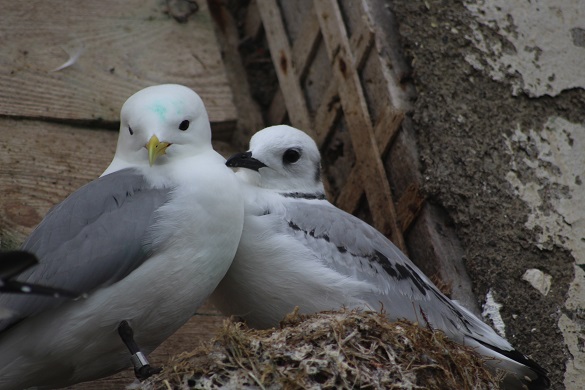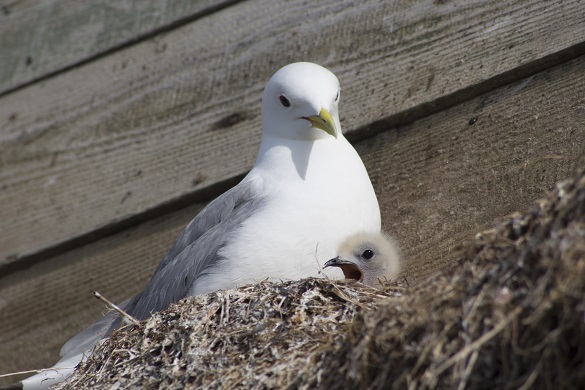
Image credit: Steph Harris
Seabird couples with similar personalities are more likely to be successful parents, which in turn makes them less likely to seek another partner, according to a new study by the University of Liverpool.
In a paper published in the journal Ethology, researchers found that black-legged kittiwake couples that were more compatible were less likely to lose their chicks, which is one of the few things that can push these usually monogamous birds towards a fresh start with a new partner.
Researchers from the University’s School of Environmental Sciences studied a wild population of kittiwakes in Svalbard in the Arctic Circle to find out how their personality compatibility related to their success as a parent and as a couple.
Each bird undertook a personality test to assess their level of boldness, which involved studying their reaction to a blue plastic penguin toy. The research team then compared personalities within mated pairs and connected these to their parenting success and also their chances of getting divorced.

They found that couples with a greater difference in personality were more likely to lose their chicks and that this in turn, made divorce more likely.
Kittiwakes breed in very tough conditions and a single parent cannot provide enough care to successfully raise their chicks, and so parents depend on one another to help find food and protect the nest.

Image credit: Steph Harris
Fionnuala McCully, PhD candidate and lead author of the research, said: “Our findings suggest that having similar personalities within pairs makes it easier for parents to predict and respond to each other’s behaviour.
“Seabird parents spend long periods of time apart when they are finding food at sea, and so they often need to make decisions without having their partner there for reference. If you and your partner have similar personalities, you might also make similar decisions. What would my partner do in this situation? Easy, the same thing that I would do! And when your partner is more predictable, it is easier for you to make informed choices which benefit you both.”
“After all, human relationships thrive on compatibility and our lives are easier when we can predict how our partner might react in challenging circumstances. This research suggests that animal relationships may need exactly the same thing.”
Seabirds such as kittiwakes live for a surprisingly long time, often well into their 30s and beyond. They usually keep the same partner for most of their lives, as finding a new one takes time and energy so when they do get divorced, it has to be for good reason such as losing a chick.
Despite being the world’s most common species of gull, kittiwake numbers are in dramatic decline worldwide due to a combination of climate change and other human activity (such as overfishing) that have made it harder and harder for them to raise their chicks to adulthood. Without changes to human behaviour, no level of personality compatibility will be enough to prepare the kittiwakes for the challenges they face in the future.
The paper `Links between personality, reproductive success and re-pairing patterns in a long-lived seabird’ (doi: 10.1111/eth.13405) is published in the journal Ethology.
Fionnuala McCully is a PhD candidate in the Department of Earth, Ocean and Ecological Sciences and won the University of Liverpool leg of the 2023 Three Minute Thesis’ (3MT®) competition which challenges researchers to present their research to a non-specialist audience in just three minutes.
Watch Fionnuala’s winning 3MT presentation entitled `Lovebirds or loathebirds? Personality and divorce in an Arctic seabird’ here: